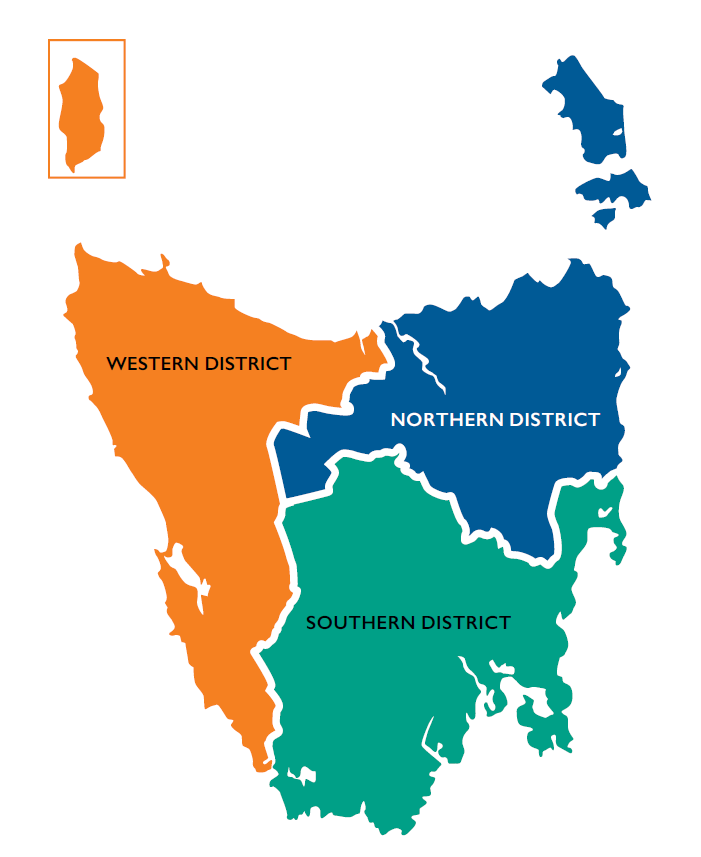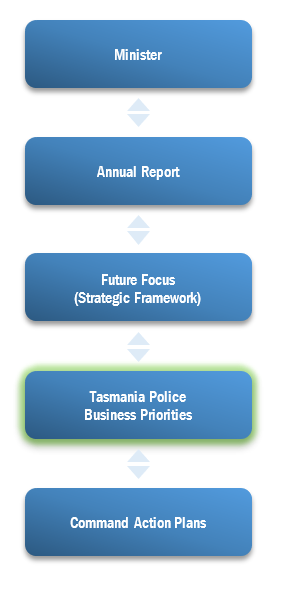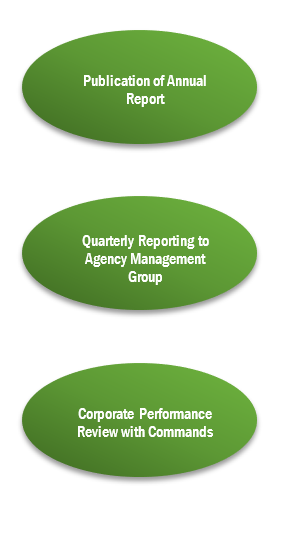>> Download the Tasmania Police Business Priorities 2022-2023 (MS Word document)
Message from the Commissioner
I am pleased to present the Tasmania Police Business Priorities 2022-23. This is a key strategic document to ensure that we continue to deliver on our responsibility to provide quality policing services to the Tasmanian community.
Our priorities align with the Department of Police, Fire and Emergency Management’s overarching Future Focus strategic framework, and provide the structure for us to deliver on our four output groups: Public Safety, Crime, Traffic Policing and Emergency Management. Each Tasmania Police priority area has identified key focus areas that emphasise how we will report against and monitor our progress.
I am pleased to announce that we are now at our highest ever establishment number. Although we have seen continued growth in our police numbers over the last eight years, concentrating on meeting establishment targets will be a key priority for us over the next few years. This will include developing a new marketing campaign to attract recruits to the service.
Supporting our current workforce on the front line will continue to remain a high priority as we put the wellbeing of our people in the forefront through roster reform, workforce planning and country policing.
We are committed to keeping our roads and our community safe. We have all been saddened by this year’s devasting loss of life and injury on Tasmanian roads. In order to achieve our ‘Toward Zero’ vision of no deaths or serious injuries, we have made traffic policing a key priority this year. We intend to concentrate our efforts in increasing our visibility on Tasmanian roads and focus on high-risk driver behaviour to ensure that members of our community reach their destinations safely.
Protecting the most vulnerable members of our community is important to Tasmania Police. We are developing a pilot for Multi-Disciplinary Centres that will focus on co-location and collaboration to provide immediate and integrated support to victim survivors of family and sexual violence. We will also continue to support the Commission of Inquiry into the Tasmanian Government Responses to Child Sexual Abuse in Institutional Settings.
Providing modern, functional, fit-for-service and accessible facilities for both employees and the community has been a major commitment by the Government. We are now in the position to continue to upgrade our aging police stations and develop state-of-the-art emergency management facilities across the State.
The past 12 months have seen us demonstrate agility and flexibility as we continued to navigate the COVID-19 pandemic and provide high quality policing services. Tasmania Police plays a key role in keeping the community safe and to this end, I thank you for rolling up your sleeves for the COVID-19 vaccine. This collective action not only ensures that we are keeping our workforce safe but doing our bit to protect the most vulnerable members of our community. To assess our performance in this area, we will be conducting an evaluation of the State Control Centre/COVID Coordination Centre response to the COVID 19 pandemic.
As this will be my last Business Priorities document before I retire as Commissioner of Police, I would like to take this opportunity to give my heartfelt thanks and appreciation to all members of Tasmania Police and State Service employees for their professionalism, dedication and commitment in implementing these business priorities.
D L Hine
Commissioner of Police
About Us
Tasmania Police is an operational arm of the Department of Police, Fire and Emergency Management. The Department’s other arms are the Tasmania Fire Service and the State Emergency Service, with corporate support provided by Business and Executive Services.
Tasmania Police is responsible for delivering quality policing services in Tasmania. Tasmania Police consists of eight commands, including three geographical police districts (Southern, Northern and Western) and five specialist support commands (Crime and Intelligence, Education and Training, Operations Support, Professional Standards, and Special Response and Counter-Terrorism).
This document outlines the business priorities for Tasmania Police and support the overall vision for the Agency. In many of these priorities Tasmania Police works in collaboration with other areas of the Department.
Tasmania Police Districts Map

Figure 1: Map showing Tasmania Police Geographic Districts
> Click here to download the Tasmania Police Organisation Chart as at July 2022 (MS Word document)
Business Planning

Business Monitoring

Our Vision, Mission, Values and Principles
The Department has a common vision and mission for all its operational arms, and this is supported by a set of principles. These principles guide the delivery of our services and the behaviours of our people.
Tasmania Police supports this vision, mission and principles, and these underpin the priorities outlined in this document.
The Department has a common vision and mission for all of its operational arms and this is supported by a set of principles. These guide the delivery of our services and the behaviours of our people. Tasmania Police supports this vision, mission and set of principles, and these underpin the priorities outlined in this document.
Our Vision:
- A safe, secure and resilient Tasmania
Our Mission:
- To provide effective policing, fire and emergency management services
Our Values:
- Integrity: We believe in honest, professional, transparent and ethical behaviour in all aspects of our business
- Equity: We believe in fair, consistent and inclusive behaviour when interacting with our people and our community
- Accountability: We believe in being answerable for our decisions and actions, behaving professionally and being responsible for our outcomes
Our Principles:
- Community Focus: We will engage and work with the community to provide effective services for the community
- Collaboration: We will work together and with others to achieve positive outcomes
- Values-led: Our service and behaviours will reflect our values
- Professional: We will be respectful, honest, confident and competent
- Accountable: We will be responsible and transparent
Strategic Direction
The strategic direction document, Future Focus 2017-2020, establishes the strategic direction for the Department. Future Focus identifies four areas of strategic focus for the Agency as a whole, and for its operational services. Tasmania Police has incorporated these into our business priorities for the year ahead to deliver strong outcomes across all levels of our activities.
Focus areas for 2022-23:
- Supporting a healthy and resilient workforce
- Building frontline capability
- Enhancing trust and strengthening community relationships
- Capitalising on interoperable emergency services
Strategic Output Groups
Police operations consist of four key output groups. Each output group has a specific aim, a set of priority areas and a key focus with performance measures. These are used to track and report progress towards realising our vision.
- Output Group 1: Public Safety
- Output Group 2: Crime
- Output Group 3: Traffic Policing
- Output Group 4: Emergency Management
Tasmania Police Key Priorities
The Department undertakes a number of whole-of-agency projects which are supported by Tasmania Police.
Tasmania Police has identified five key priorities for 2022-23 that are of strategic or whole of service significance.
Recruiting
Continue recruiting to meet target increases in police numbers. This will include the development of a new marketing campaign.
Supporting the front line
Continue to develop and analyse key policies regarding roster reform, future workforce planning, well-being support and country policing.
Mutli-Disciplinary Centres
Develop a pilot for the Multi-Disciplinary Centres that focus on co-location and collaboration to provide immediate and integrated support to victim survivors of family and sexual violence.
Traffic Policing
Implement structural modifications to traffic policing relating to key policies and traffic priorities.
Asset Infrastructure and Development
Manage infrastructure projects that support contemporary policing and emergency management services. This includes upgrades to the Launceston, Rosebery and Bridgewater Stations, the development of the new St Helens Station, the Special Operations Group facility, and the Sorell Emergency Management Hub.
Priorities by Output Group
Output Group 1: Public Safety
Aim: For the community to feel safe and be safe
Priority Area and Key Focus:
- High visibility policing
- High visibility engagement and reassurance strategies
- Satisfaction with policing services
- Satisfaction with police in dealing with public order issues
- Policing public places
- Public place assaults
- Public order incidents
- Safety in public places
Output Group 2: Crime
Aim: To reduce crime
Priority Area and Key Focus:
- Victim and other serious crime
- Serious crime offences
- Person offences
- Assault
- Drug Crime
- Serious drug offenders
- Violence against women and children
- Family violence arrests
- Family violence response
- Priority family violence perpetrators
- Assault and sexual assault
- Assault and sexual assault against children
- Child exploitation
- Volume crime
- Home and business burglaries
- Motor vehicle crime
- Repeat offenders
- Firearm crime
- Incidents involving firearms use
- Stealing of firearms
Output Group 3: Traffic Policing
Aim: To improve driver behaviour through traffic law enforcement
Priority Area and Key Focus:
- Road Safety
- Collaborate and engage with government partners to reduce serious and fatal crashes
- Intelligence led high visibility policing
- High-risk road behaviour
- High-risk traffic offenders
- Evade police offenders
- Speeding
- Use of seatbelts
- Alcohol and drug driving
- Mobile phone use
- Inattention
Output Group 4: Emergency Management
Aim: To contribute towards community resilience through effective security and emergency management
Priority Area and Key Focus:
- Provide leadership and effective incident management during emergency responses
- Operationalise the All-Hazards coordination and control centre
- Conduct an evaluation of the State Control Centre/COVID Coordination Centre response to the COVID-19 pandemic
- Operational preparedness
- Undertake All-Hazards emergency management exercises
- Commence a targeted review of the Emergency Management Act 2006 to modernise key parts of the legislation to incorporate lessons learned during COVID-19
Priorities by Support Command
Crime and Intelligence Command
Priority Area and Key Focus:
-
- Sexual and Family Violence Support and Investigation
- Establish two regional Multi-Disciplinary Centres to provide co-located and integrated support and safety services to victim-survivors
- Establish a framework to ensure the effective investigation of complaints of sexual and family violence
- Support the remit of the Safe Families Coordination Unit to create a state-wide intelligence hub to deliver an enhanced intelligence capability for both sexual and family violence
- Commission of Inquiry
- Lead the Tasmania Police response to the Commission of Inquiry
- Serious and organised crime
- Serious crime offences
- Criminal networks
- High-risk drugs
- Firearm crime
- Cyber and Child Exploitation Crime Division
- Enhance cybercrime investigation capacity and capability
- Child exploitation investigation
- Serious financial crime investigation
- Telecommunications interception compliance
- State Intelligence Service
- Increase capability of criminal intelligence gathering and analysis
- Human source capability
- Develop and implement a policy and procedure for the management of Human Source Capabilities
- Sexual and Family Violence Support and Investigation
Education and Training
Priority Area and Key Focus:
- Recruitment
- Continue to recruit to meet the Tasmanian Government commitment to increase police numbers.
- Review and evaluate the recruitment selection process to ensure it is contemporary and prioritises applicant resilience.
- Recruit Training
- Review the Northern based pilot recruit program to determine the future direction of the concept.
- Learning and Development Services
- Examine opportunities for the procurement of a consolidated student management system.
- Review in-service training to identify opportunities to expand online learning and facilitate the delivery of courses external to the Police Academy.
Operations Support
Priority Area and Key Focus:
- Firearms Licensing and Registration
- Ensure appropriate structures are in place to manage a peak year of firearms licensing.
- Helicopter services
- Support the project for a future helicopter service, in conjunction with the Department of Health.
- Police vessel replacement
- Replacement of PV Van Diemen (Project Discovery)
- Safe Families Coordinator Unit (SFCU)
- Support the implementation of Multi-Disciplinary Centres and the expansion of the remit of the SFCU to include sexual violence
- Tasmanian Government Radio Network (TasGRN)
- Ensure a safe and successful transition to the TasGRN
- Forensic Register
- Progress the replacement of the Forensic Register in partnership with Forensic Science Service Tasmania
Professional Standards
Priority Area and Key Focus:
- Police response to family violence
- Conduct a review of the police response to medium and high-risk family violence reports.
- Family and sexual violence involving Police Officers
- Implement the Family and Sexual Violence Involving Police Policy and the Review Committee.
- Police response to child sexual abuse investigations
- Conduct random audits of child sexual abuse investigations to ensure compliance with mandated training and victim centric approach.
- Review post police shootings procedure
- Review current policies and procedures in relation to post police shootings.
Special Response and Counter Terrorism
Priority Area and Key Focus:
- Build and support terrorism resilience
- Promote counter-terrorism awareness both inward facing (police) and outward facing (community) through direct engagement and exercising.
- Emergency management
- Administer upgrade of WebEOC and inform cross agency awareness.
- Embed the operation of the new State Control Centre.
- Build and support capability and capacity
- Finalise the business model for management and deployment of the full-time Special Operations Group.
- Formalise the framework for the statewide Remote Piloted Aircraft Systems model



